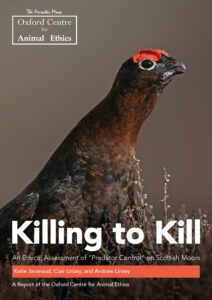Latest news
Press Release: “Predator control” on Scottish moors causes tremendous, unjustifiable suffering to animals, say academics
4th December 2023
 Over 120 academics worldwide have backed a report that calls for an end to snaring, trapping, and poisoning animals on Scottish moors. Animals are killed in order to artificially inflate grouse populations for shooting.
Over 120 academics worldwide have backed a report that calls for an end to snaring, trapping, and poisoning animals on Scottish moors. Animals are killed in order to artificially inflate grouse populations for shooting.
“The best available estimates indicate that as many as 260,000 animals are killed as a result of legal ‘predator control’ practices each year in Scotland” maintains the Report.
The Report is signed by numerous ethicists and philosophers, including Scottish academics from the universities of St Andrews, Edinburgh, Stirling, and Aberdeen, and the Nobel Laureate, J. M. Coetzee.
Titled “Killing to Kill,” the 71 page Report by the Oxford Centre for Animal Ethics graphically details how each method of control “causes suffering, or prolongs suffering, or makes animals liable to suffering.”
Snares are condemned because they “inevitably mean that animals can struggle for hours in considerable pain and distress.” Even the supposedly most humane trap, the DOC (Department of Conservation) trap, only kills 80% of its victims quickly, while the remaining 20% are left to suffer appalling injuries, with no requirement for inspection. And poisons mean that animals suffer for days.
“This is a major moral issue” claims Centre director the Revd Professor Andrew Linzey, “it simply cannot be right to cause tremendous suffering for non-essential purposes. When we began the Report, we knew hardly anything about these control measures, but we have been staggered by the degree of suffering. Few people are cognizant of the situation. It is a much neglected and overlooked area of animal cruelty.”
The Report concludes by calling for a new charter for free-living animals. “Scotland could lead the way in pioneering legislation that encompasses not only domestic animals, but also free-living ones. This legislation should begin with the recognition of sentiency and enshrine in law the value and dignity of free-living animals such that their right to live unmolested is respected.”
The Report is written by a fellow and the directors of the Centre, Dr Katie Javanaud, Dr Clair Linzey, and the Revd Professor Andrew Linzey. It was commissioned by the Scottish charity, the League Against Cruel Sports, but is an entirely independent report and at no point did the League seek to influence the Report’s findings or conclusions.
Director of the League Against Cruel Sports Scotland Robbie Marsland, commented: “The League Against Cruel Sports is not surprised that many people believe Scotland’s “grouse moors” are an animal ethics free zone. Polling shows that 76% of Scots do not support the practice of ‘predator control’ to kill hundreds and thousands of animals so that more grouse can be shot for entertainment. This report clearly outlines the ethical case against this uncontrolled killing. The biggest surprise is that any suggestion that this killing should stop is met with incredulity by the shooting fraternity. We hope the report will open the eyes of politicians considering the Wildlife Management and Muirburn (Scotland) Bill to the enormous ethical issues before them.”
The Report can be viewed online here.
Editor’s Notes:
- For media enquiries please contact Sophie at Panpathic Communications: Sophie@panpathic.com / 07815 860 082
- Dr Katie Javanaud and Dr Clair Linzey are available for interview.
- An image of the report is available to download here.
- The Oxford Centre for Animal Ethics is an independent Centre which pioneers ethical perspectives on animals through research, teaching, and publication. It comprises a fellowship of more than 140 academics worldwide. The Centre collaborates with Palgrave Macmillan on the Palgrave Macmillan Animal Ethics Series which has published more than forty books to date. It also publishes the Journal of Animal Ethics in partnership with the University of Illinois Press. The Centre organises the Annual Oxford Animal Ethics Summer School each year, held at Merton College, Oxford.
- The League Against Cruel Sports is Britain’s leading charity that works to stop animals being persecuted, abused, and killed for sport. The League was instrumental in helping bring about the landmark Hunting Act. It carries out investigations to expose law-breaking and cruelty to animals and campaign for stronger animal protection laws and penalties. The League also works to change attitudes and behaviour through education and manage sanctuaries to protect wildlife. Registered charity in England and Wales (no.1095234) and Scotland (no.SC045533).